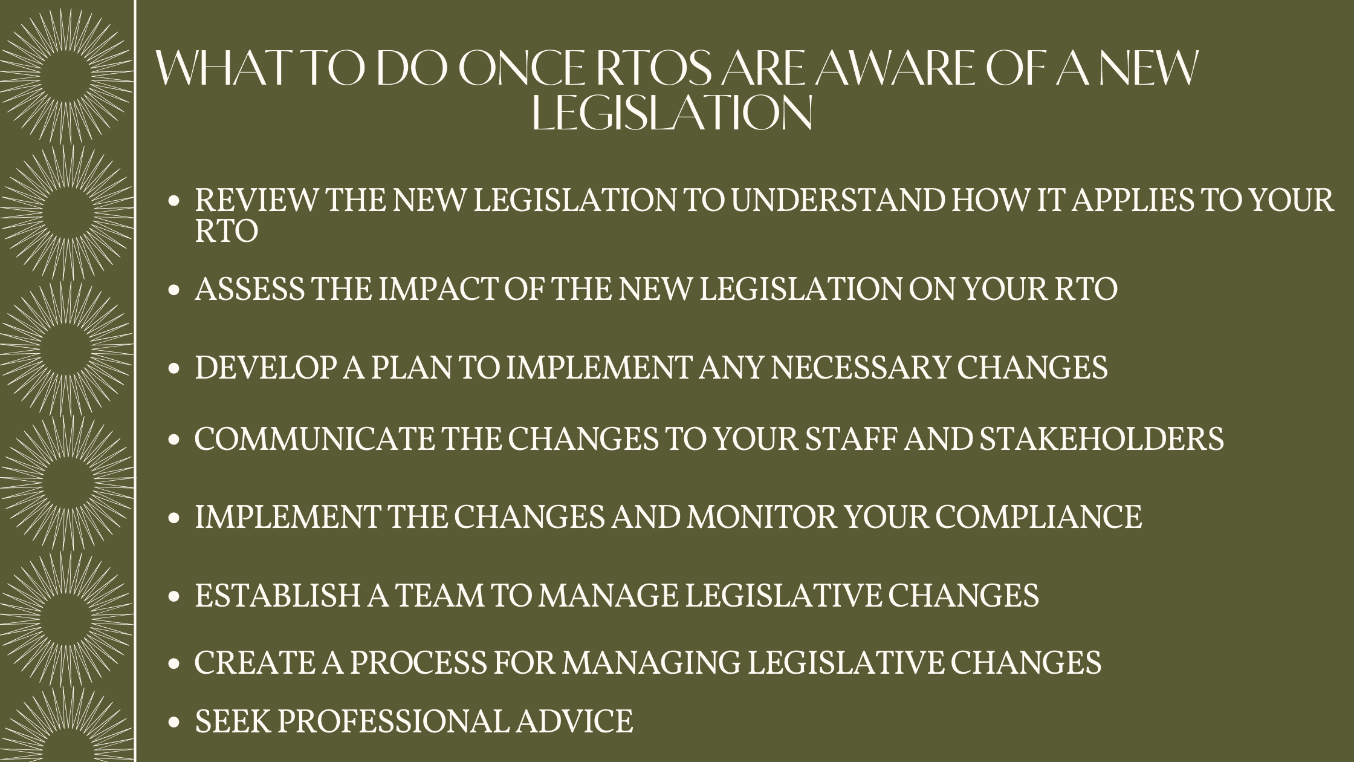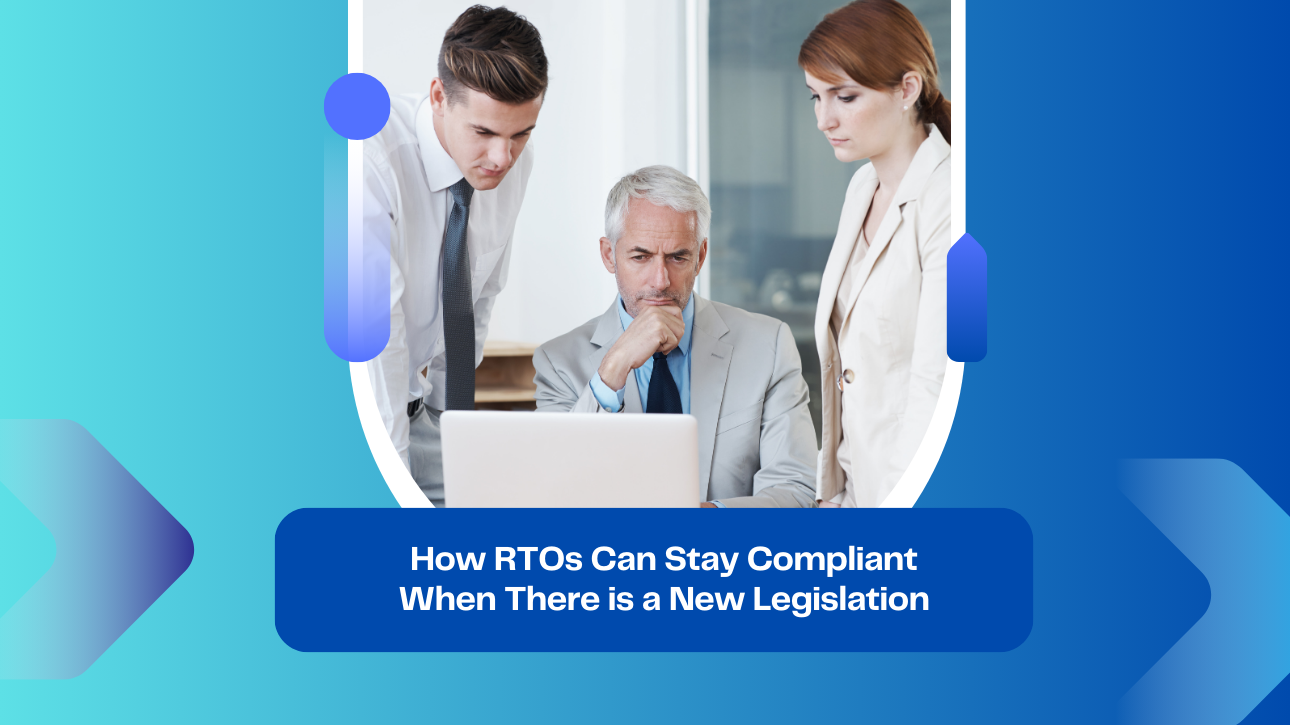Introduction
Have you ever wondered what happens when new RTO legislation is introduced that affects your business? As a registered training organisation (RTO) in Australia, you’re probably used to staying up to date on the latest changes, but it can be tough to keep track of everything.
In this blog post, we’ll break down the steps you can take to stay compliant with new RTO legislation in Australia.
What is New Legislation
New RTO legislation is any RTO law or regulation that is newly enacted or amended. It can have a significant impact on registered training organisations (RTOs), as it may affect their operations, policies and procedures.
New RTO legislation can be introduced for a variety of reasons, such as:
- To improve the quality of training.
- To protect students and consumers.
- To promote fair competition.
- To respond to changes in the industry or the workforce.
In the past Australian VET has seen some significant changes in RTO legislation like:
Why is it Important for RTOs to Comply with New RTO Legislation
- To protect students and consumers. New legislation is often introduced to address concerns about the quality of training or to protect students from unfair or unethical practices. By complying with new legislation, RTOs can help to ensure that their students are receiving high-quality training and that they are being treated fairly.
- To maintain their accreditation. RTOs must be accredited by the Australian Skills Quality Authority (ASQA) in order to operate. ASQA requires RTOs to comply with all relevant legislation in order to maintain their accreditation.
- To avoid penalties. RTOs that fail to comply with new legislation may face a range of penalties, including fines, suspension or cancellation of their accreditation.
- To maintain their reputation. RTOs that are known to be compliant with all relevant legislation are more likely to be trusted and respected by students, employers, and other stakeholders.
How to Stay up to date on New Legislation
- Pay attention to announcements from relevant government agencies. This is important because government agencies are responsible for developing and implementing new legislation. For example, if a change is made to the National Vocational Education and Training Regulator Act 2011, the Australian Skills Quality Authority (ASQA) will likely issue a notice about it on its website.
- Stay subscribed to email updates from bodies such as ASQA or other sector peak bodies. Sector peak bodies are organisations that represent the interests of a particular industry or sector. They often have a lot of knowledge about legislative changes that may affect their members. For example, ASQA is the sector peak body for vocational education and training (VET) in Australia.
- Check sector-specific news sources regularly. There are a number of news websites and publications that focus on specific industries or sectors. These sources can be a good way to learn about legislative changes that may affect your business.
- Attend relevant events and conferences where updates are often provided. Industry events and conferences can be a great way to learn about legislative changes and other developments in your industry. Speakers at these events often include representatives from government agencies, sector peak bodies, and other organisations that are involved in developing and implementing new legislation.
- Join relevant industry associations. Industry associations can be a good way to stay informed about legislative changes and other developments in your industry. They also often provide their members with access to resources and support that can help them to comply with new legislation.
- It is always a good idea to consult with a legal professional: A legal professional can help you to understand the new legislation and how it applies to your business. They can also advise you on the steps you need to take to comply with the new legislation.
- Check the Australian Government’s Legislation Register regularly: The Legislation Register is a website that contains all of the legislation that has been passed by the Australian Government. You can use the Legislation Register to search for new legislation that may affect your business.
- Stay informed about industry news and developments. Changes to legislation often come about as a result of wider changes in the industry or sector. By keeping up with industry news and developments, you’ll be in a better position to anticipate legislative changes that might affect your training organisation.
- Talk to other training organisations and sector bodies. Keeping in touch with others in your industry will help you stay abreast of legislative changes that might affect your training organisation. You can talk to other RTOs, sector bodies, or even your competitors to get their insights on the latest legislative changes.
- Keep an eye on government consultations. The Australian Government often consults with industry and the public on proposed changes to legislation. By taking part in these consultations, you can have a say in the development of legislation that affects your training organisation. You can find information about government consultations on the Australian Government’s Consultation Hub website.
What to do Once RTOs are Aware of a New Legislation

- Review the new legislation to understand how it applies to your RTO. The first step is to read and understand the new legislation to determine how it applies to your RTO. You should pay attention to the key requirements of the legislation, the implementation timeline, and any penalties for non-RTO compliance.
- Assess the impact of the new legislation on your RTO. Once you understand how the new legislation applies to your RTO, you should assess the impact it will have on your operations, policies, and procedures. You may need to make changes to your RTO in order to comply with the new legislation.
- Develop a plan to implement any necessary changes. If you need to make changes to your RTO in order to comply with the new legislation, you should develop a plan to implement those changes. Your plan should include a timeline, resources, and responsibilities.
- Communicate the changes to your staff and stakeholders. Once you have a plan to implement the necessary changes, you should communicate those changes to your staff and stakeholders. This will help to ensure that everyone is aware of the changes and is prepared to comply with them.
- Implement the changes and monitor your compliance. Once you have communicated the changes to your staff and stakeholders, you should implement those changes and monitor your compliance with the new legislation. You should also keep an eye on any further changes to the legislation and make adjustments to your compliance plan as needed.
- Establish a team to manage legislative changes. This team should include representatives from different areas of your RTO, such as governance, compliance, training delivery, and student services.
- Create a process for managing legislative changes. This process should include steps for identifying, assessing, and implementing changes to your RTO’s policies, procedures, systems, and processes.
- Seek professional . If you are unsure about how a legislative change will impact your RTO, or if you need help implementing changes, you should seek professional advice from an RTO consultant or lawyer.
Conclusion
It is important for registered training organisations (RTOs) to be aware of and comply with new RTO legislation. New legislation can have a significant impact on RTOs, so it is important for them to have a plan in place for managing legislative changes.
Are you an RTO looking for quality RTO training resources? If yes, then VET Resources is your partner. We also have a YouTube Channel with videos on RTO related matters. We also offer free consultation to RTOs. For further information please contact here.
Frequently Asked Questions (FAQs)
Q.1. What is the impact of legislation changes on students?
A.1. Legislation changes can have a significant impact on students. For example, legislation changes governing student loans or scholarships can affect students’ ability to afford their education. Legislation changes governing student rights and responsibilities can affect students’ experiences in the classroom and beyond.
Q.2. How can registered training organisations (RTOs) in Australia ensure compliance with the latest legislation in a timely manner and make necessary adjustments as needed?
A.2. RTOs can do this by:
- Staying informed about the latest legislation.
- Assessing the impact of new legislation on their RTO.
- Develop a plan to implement any necessary changes.
- Implementing the changes and monitoring national compliance.
Q.3. What is the best course of action for training organisations to ensure that their training methods are compliant with new RTO laws and regulatory updates?
A.3. The best course of action could be
- Create a culture of compliance.
- Seek professional advice.

